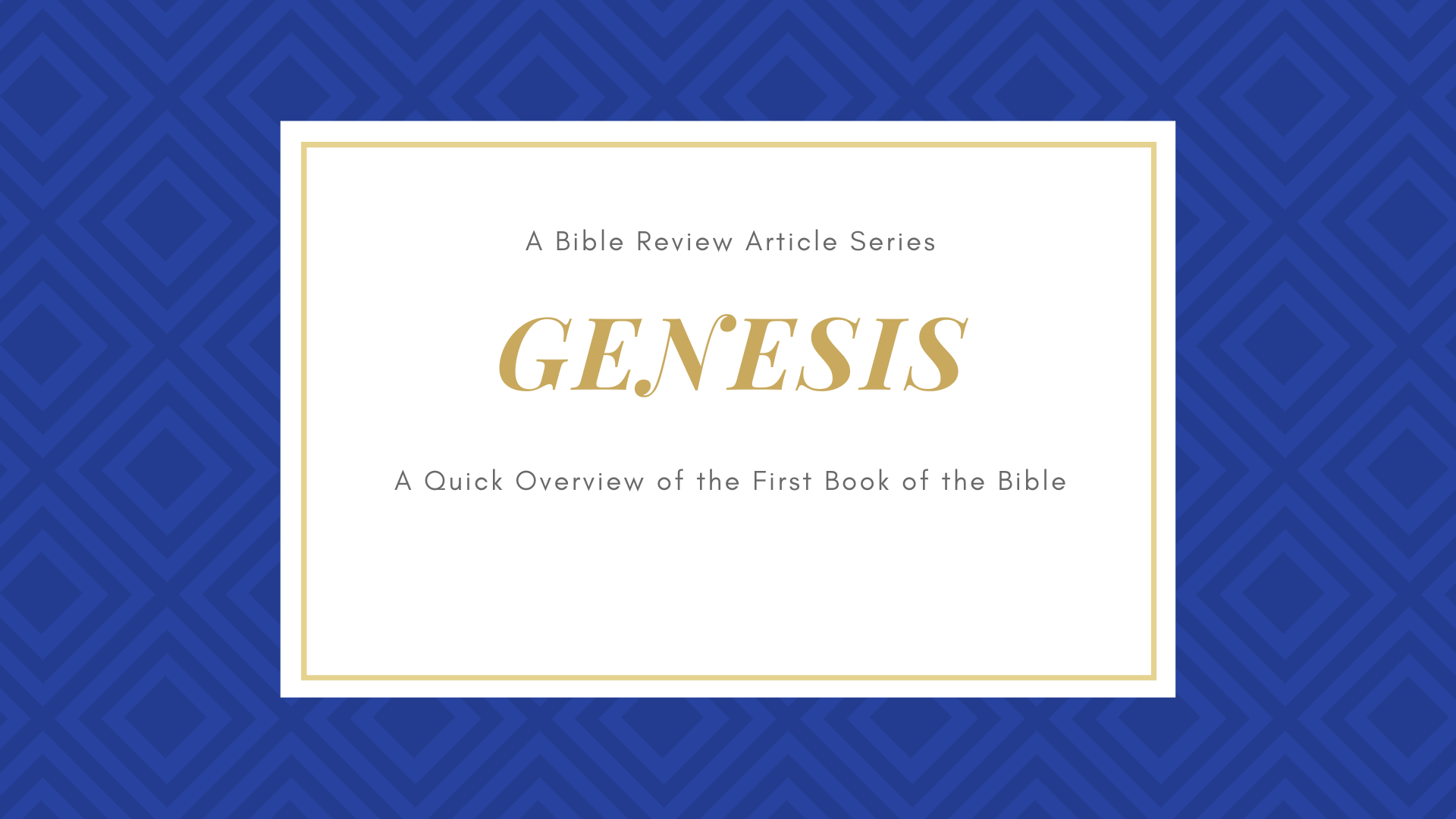
Genesis:
A Quick Overview of the First Book of the Bible
by Milo





Follow us on social media for
FREEBIES and New Article releases.
OR
Sign Up for Our Freebie Email List and Have Freebies Delivered Directly To Your Inbox
Introduction
The Book of Genesis is the first book of the Bible and lays the foundation for the entire biblical narrative. It covers the origins of the world, humanity, sin, and God's covenant relationship with His people. Genesis is a key part of the Old Testament and is classified as a book of the Law (Torah) in Jewish tradition.
Authorship and Date
Traditionally, Moses is credited as the author of Genesis, along with the rest of the first five books of the Bible, known as the Pentateuch. Many scholars suggest that Genesis was written during the 15th or 13th century BC. The book includes historical accounts, genealogies, and narratives passed down through generations.
Purpose and Themes
Genesis serves as the foundation for understanding God’s plan for humanity. Key themes include:
- Creation:
God as the Creator of the universe.
- Sin and Redemption:
The fall of man and God’s plan for salvation.
- Covenant:
God’s promises to Noah, Abraham, Isaac, and Jacob.
- Faith and Obedience:
Examples of trust in God, such as in Abraham’s journey.
- God’s Sovereignty:
His control over history and human affairs.
Key Verses
- Genesis 1:1
"In the beginning, God created the heavens and the earth."
- Genesis 3:15
"And I will put enmity between you and the woman... He will crush your head, and you will strike his heel."
- Genesis 12:2-3
"I will make you into a great nation, and I will bless you... and all peoples on earth will be blessed through you."
- Genesis 50:20
"You intended to harm me, but God intended it for good."
- Genesis 15:6
"Abram believed the Lord, and he credited it to him as righteousness."
Summary of Content
Genesis can be divided into two main sections:
Chapters 1-11: Primeval History
- Creation of the world (Chapters 1-2)
- The fall of man (Chapter 3)
- The flood and Noah’s ark (Chapters 6-9)
- The Tower of Babel (Chapter 11)
Chapters 12-50: Patriarchal History
- God’s covenant with Abraham (Chapters 12-25)
- The lives of Isaac, Jacob, and Esau (Chapters 26-36)
- Joseph’s rise to power in Egypt (Chapters 37-50)
Notable Characters
- Adam and Eve:
The first humans.
- Noah:
Built the ark and survived the flood.
- Abraham:
The father of many nations.
- Jacob:
Later named Israel, father of the twelve tribes.
- Joseph:
Sold into slavery but rose to power in Egypt.
Application and Relevance
The Book of Genesis serves as a foundation for understanding God’s relationship with humanity. It introduces core themes such as creation, sin, redemption, and faith. The stories of Adam and Eve, Noah, Abraham, and Joseph provide valuable lessons on obedience, trust, and divine purpose. Through these narratives, readers are encouraged to reflect on their own faith journey and recognize God’s sovereignty in their lives.
Genesis also highlights the importance of faith and perseverance. Abraham’s unwavering belief in God's promises sets an example for trusting in divine plans, even when circumstances seem uncertain. Joseph’s story teaches the power of forgiveness and resilience, showing how God can use even the most challenging situations for a greater purpose. These timeless lessons continue to inspire believers today in their spiritual and personal growth.
Connections to Other Books
Genesis serves as the starting point for many themes that unfold throughout the Bible. The covenant God establishes with Abraham finds fulfillment in the New Testament through Jesus Christ. The fall of humanity in Genesis 3 sets the stage for the need for redemption, a theme that culminates in the life, death, and resurrection of Jesus in the Gospels.
Additionally, Genesis connects closely with books like Exodus, where God's promises to Abraham’s descendants begin to materialize through the formation of Israel. The wisdom literature, such as Psalms and Proverbs, often references creation and God’s faithfulness, reinforcing themes introduced in Genesis. The prophetic books, especially Isaiah, echo the hope of restoration first hinted at in Genesis 3:15.
Study Questions
- 1. What does the creation account teach about God’s nature and power?
- 2. How did Adam and Eve’s choice affect humanity?
- 3. What does Noah’s obedience reveal about faith?
- 4. How does God’s covenant with Abraham shape biblical history?
- 5. What lessons can be learned from Jacob’s struggles and transformation?
- 6. How did Joseph’s trust in God impact his journey from slavery to leadership?
- 7. How does the story of Babel relate to human pride and unity?
- 8. What role does faith play in the lives of the main figures in Genesis?
- 9. How does Genesis set the foundation for God’s plan of redemption?
- 10. What personal applications can be drawn from the lives of Abraham, Joseph, and Jacob?
Frequently Asked Questions
- 1. Who wrote the Book of Genesis?
Moses is traditionally credited as the author of Genesis, along with the rest of the Pentateuch.
- 2. What is the main theme of Genesis?
Genesis focuses on creation, sin, redemption, and God’s covenant with His people.
- 3. Why are there two creation accounts in Genesis?
Genesis 1 provides a broad overview of creation, while Genesis 2 gives a detailed account of humanity’s formation and purpose.
- 4. What is the significance of Abraham in Genesis?
Abraham is the father of faith and the recipient of God’s covenant, which laid the foundation for Israel and ultimately the coming of Christ.
- 5. What lessons can be learned from the story of Joseph?
Joseph’s story teaches perseverance, faith in God’s plan, and the power of forgiveness.
- 6. How does Genesis explain the origin of sin?
Genesis 3 describes the fall of humanity when Adam and Eve disobeyed God, introducing sin into the world.
- 7. What was the purpose of the flood in Genesis?
The flood was a divine judgment on human wickedness, but it also demonstrated God’s grace through Noah’s salvation.
- 8. How does Genesis relate to the New Testament?
Genesis introduces themes of sin, faith, and God’s promises that are fulfilled in Christ.
- 9. What is the significance of Jacob’s name change to Israel?
Jacob’s name change marks his transformation and the beginning of the nation of Israel.
- 10. How does Genesis end?
Genesis ends with Joseph’s death in Egypt, setting the stage for Israel’s growth and eventual Exodus.
Daily Reading Plan
| Day |
Reading |
| Day 1 |
Genesis 1-3 |
| Day 2 |
Genesis 4-7 |
| Day 3 |
Genesis 8-11 |
| Day 4 |
Genesis 12-15 |
| Day 5 |
Genesis 16-18 |
| Day 6 |
Genesis 19-21 |
| Day 7 |
Genesis 22-24 |
| Day 8 |
Genesis 25-26 |
| Day 9 |
Genesis 27-29 |
| Day 10 |
Genesis 30-31 |
| Day 11 |
Genesis 32-33 |
| Day 12 |
Genesis 34-36 |
| Day 13 |
Genesis 37-39 |
| Day 14 |
Genesis 40-41 |
| Day 15 |
Genesis 42-44 |
| Day 16 |
Genesis 45-46 |
| Day 17 |
Genesis 47-49 |
| Day 18 |
Genesis 50 |

More Bible Overviews
Genesis Overview
Exodus Overview
Proverbs Overview
Ecclesiastes Overview
Isaiah Overview
Daniel Overview
Matthew Overview
Gospel of John Overview
Acts Overview
Romans Overview
1 Corinthians Overview
Revelation Overview
Freebie Offers
Sign Up for Our Freebie Email List and Have Freebies Delivered Directly To Your Inbox
Recommended Reading
Feeding Your Spiritual Growth: Best Online Bible Study Platforms
Strengthen Your Spirit: Impactful Bible Study Topics for Believers
Find Your Voice: Expressive Church Journal Prompts for Christians
Journey to Enlightenment: Best Bible Study Tools for Growth
From Busyness to Fruitfulness: A Biblical Approach to Time Management (Part 1)
From Busyness to Fruitfulness: Biblical Strategies for Effective Time Use (Part 2)
SOAP Bible Study and Other Study Methods: Which One is Right for You?
How to Use the SOAP Bible Study Method for a Deeper Walk of Faith
How to Study the Psalms Using the SOAP Method
Applying Biblical Wisdom to Financial Decision-Making
Visit Us on Pinterest









